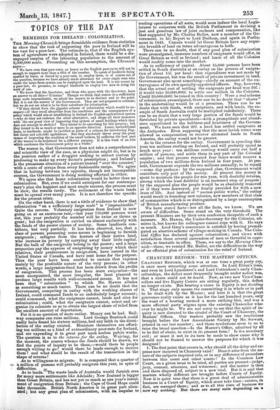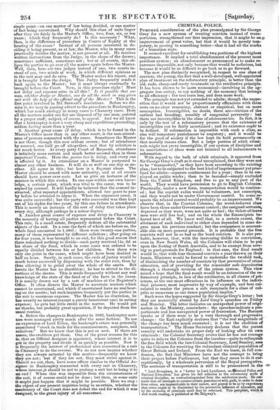CHANCERY REFORM: THE MASTERS' OFFICES. CHANCERY REFORM, which was at
one time a great party cry, is once more attracting some attention. In Lord Eldon's time, and even in Lord Lyndhurst's and Lord Cottenham's early Chan- cellorships, the defect most frequently brought under notice was, that a cause could not be heard. Now, as two new Vice-Chan- cellors and live Equity Courts are sitting regularly, this defect no longer exists. But hearing a cause in Equity is not deciding it. That stage only means the committing it in whole or in part to be dealt with by the Master; and here it is that the great grievance really exists as it has for the last hundred years, only
the want of a hearing seemed a more striking blot, and was a more effectual party stigma upon the existing Chancellor who- ever he might be. We are not sorry to see that the spirit of in- quiry is now directed to the citadel of the Court of Chancery, the Masters' Offices. Our readers probably saw the resolutions brought before the Law Amendment Society by Mr. Stewart, printed in our last number ; and those resolutions seem to us to raise the broad question—Is the Master's Office, admitted by all to be full of abuse, to exist in its present form ? Is it a necessary evil ; or must it not in its turn be made to show cause why it should not be framed to answer the purposes for which it was designed ? 1. The first point that occurs is, why should all the delay and ex- pense now incurred in Chancery exist? Does it arise from the na- ture of the subjects inquired into, or in any difference of procedure between this court and other courts ? In the Common Law Court, on a given issue to be tried, all parties are present—judge, jury, counsel, attornies, and witnesses; and the, matter is then and there disposed of, subject to a new trial. But it is said that matters wholly different are brought before Courts of Equity. Now it is quite true that there is a great deal of administrative business in a Court of Equity, which must take time—estates, Ill fact, are managed there ; and as to all this class of butaness we now say nothing. But there are many snits depending on a single point—on one matter of law being decided, or one matter of fact being ascertained. Why should this class of suits linger after they are fairly in the Master's Office, two, four, six, or ten years ; which they frequently do ? Is this necessary What, then, is the difference of procedure in Courts of Equity at the hearing of the cause ? Instead of all persons interested in de- ciding it being present, as at law, the Master, who in many cases practically decides the matter, is not present at all. He receives written instructions from the Judge, in the shape of the decree ; sometimes sufficient, sometimes not ; but at all events, this ob- liges the parties to go over all the matter again before the Master. Well, then, here are two judges instead of one, two courts in- stead of one, two minds at work, in which different opinions as to the suit may and do arise. The Master makes his report, and it is brought before the Judge. This Judge frequently sends it back again to the Master; but it must always eventually be brought before the Court. Now, is this procedure right ? Must not delay and expense arise in all this ? Is it possible that one man, whether Judge or Master, can do all the work in any given suit with the help of the eicial staff if the Master? This is the first point involved in Mr. Stewart's resolutions. Before we dis- miss it, we may in passing advert to the procedure in Bankruptcy, which has much analogy in many cases to Chancery cases. Here all the matters under one fiat are disposed of by one man, assisted by a proper staff; subject, of course, to appeal. And we all know that a bankruptcy is now a very cheap and expeditious proceeding, seldom lasting more than a year. 2. Another great cause of delay, which is to be found in the Master's Office more than in any other court, is the non-attend- ance of persons connected with the cause. Sometimes the Master is not there, though this now seldom occurs ; but of attendance by counsel, one half go off altogether, and that by solicitors is not much better. At every petty Court of Requests, attendance is infinitely more certain and much better secured than in these important Courts. Here the genius loci is delay, and every one is affected by it. An attendance on a Master is postponed to almost any other business. It will do as well on one day as an- other. All agree in this ; but here is a flagrant abuse. The Master should be armed with more authority, and at all events should have power over costs. Let us give an instance of the manner in which this works. RI one case within our own know- ledge, a certain point, which was vital to the cause, was to be argued by counsel. It will hardly be believed that the counsel in- structed, after repeated appointments, allowed two years to pass by before he attended to argue it. When the argument came, it was quite successful ; but the party who succeeded was thus kept out of his rights for two years, by this one failure in attendance. This is merely an instance of the sort of delay that takes place every day, although perhaps in a minor degree.
3. Another great source of expense and delay in Chancery is the necessity of having all parties represented before the Court. This rule, in a small estate, frequently defeats all the substantial objects of the suit. In a case the facts of which are before us, the whole fund amounted to 1,4001.: there were twenty-one parties, many of them represented by different solicitors ; after going on for four years, it was brought to an end, for this good reason that there remained nothing to divide—each party received 14s. 2d. as his share of the fund, which in some cases was ordered to be equally divided between his or her children. Now there was only one point in the cause, which might have been decided in half an hour. Surely, in such cases, the ends of justice would be much better answered by dispensing with the strict rule, than by thus allowing it to grind away the whole of the assets. But herein the Master has no discretion ; he has to attend to the di- rections of the decree. This is made frequently without any real knowledge of the state of the fund or of the facts in the cause. It is usually drawn out by a sort of machine at the Registrar's Office. It often directs the Master to ascertain matters which cannot be ascertained, and which if ascertained have no real bear- ing on the merits; but such inquiries frequently put the parties in the suit to enormous expense. The Master has no discretion, he has usually no interest (except a purely benevolent one) in saving expense; he gets but little credit in the matter. He would get no thanks, but probably great opposition, if he departed from the usual routine.
4. Before the changes in Bankruptcy in 1832, bankruptcy mat- ters were managed pretty much after the same fashion. To use an expression of Lord Eldon, the bankrupt's estate was generally considered "stock in trade for the commissioners, assignees, and solicitors." But we know that this is not so now. If there are assets, the creditors get them. One of the great reasons for this is, that an Official Assignee is appointed, whose interest it is to Fat in the property and divide it as quickly as possible. Now it is frequently the interest of professional men concerned in a suit in Chancery to do the reverse. We do not now inquire whether they are always actuated by this motive—frequently we know they are not ; but if they are not, they must strive against it. Should we not, then, have some officer similar to the Official As- signee in Bankruptcy connected with every suit in Chancery, whose interest .it should be not to prolong a suit but to bring it to an end ? When this was impossible from the circumstances of the suit, it of course could not be done; but then, in some suits it might just happen that it might be possible. Here we stop : the object of our present inquiries being to ascertain, whether the machinery of the Court does not defeat the end for which it was designed, to the great injury of all concerned.



























 Previous page
Previous page